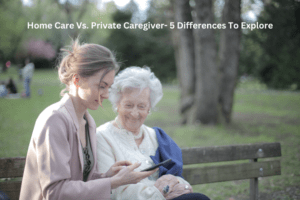Guest Blog: Home Care Vs. Private Caregiver- 5 Differences To Explore
Introduction
Back in the day, the concept of the elderly needing care was majorly related to caregiving by the family or kids. Some fortunate parents got the best care from their family, while the unlucky ones had to suffer misery, depression, and prevailing sad moods, which eventually impacted their health. It is not always the family negligence, but sometimes the situation is so challenging that the elderly themselves have to let go of their families so that the next generation does not miss out on any opportunity to improve their lives.
Some compassionate people understood the need for every senior citizen to have good company, a clean environment, food, and medicine to spend the most crucial phase of their lives in harmony. The concept of senior home care was introduced, where the elderly are provided child-like care to keep them away from any adverse event or energy.
In certain places, there are purposefully constructed home care centers carrying every necessity and plan for a peaceful life for the elderly. On the other hand, we have private caregivers who care for the elderly. People often need clarification on the two types and find it challenging to decide which suits them.
What is Private Caregiver?
Private caregivers are hired and employed directly by senior citizens or their close family. Apart from providing help to senior citizens with ADLs or IADLs, some private caregivers are also trained to provide some medical care such as wound care, injections, and monitoring vital signs. However, this is rare and would cost more at a higher hourly rate.
What is Home Care?
Home care agencies are licensed businesses that hire a team of caregivers. The agency then contracts with families to send caregivers to their loved one’s homes to provide the necessary long-term care services. Some agency-based caregivers may be certified nurses or nursing assistants who can offer medical care. Some others provide legal assistance with ADLs or IADLs.
5 Differences between Home Care and Private Caregiver
- Cost Difference
Private caregivers offer services at an affordable rate. They are averaging around $15 per hour—which can be between 20 and 30 percent lower than caregivers hired via an intermediary home care agency. On the other hand, While costs can vary significantly from place to place, home care agencies are more expensive than independent caregivers across the board. Nationally, the average hourly rate for home care through a home care agency is $20+ per hour—approximately 20 to 30 percent more than an independent caregiver.
- Certification
The home care service centers are registered with the government, and there are regular inspection raids to ensure the quality of services. The strict check also provides that the caregivers are well-trained and certified; they even have to attend regular workshops to improve their skills.
An individual hires private caregivers, so quality assurance or checks must be made by the individual, which could be more satisfactory due to the lack of resources. The certification checking services are also not available to ordinary people, so you cannot guess whether a person has a valid, accurate degree.
- Family Involvement
No matter how excellent care you get from any outsider, no one can match the happiness one brings from the love, respect, and attention received from family members. They say blood relations never fade away, which is the world’s reality.
Everyone craves love from their loved ones. In the case of in-home care service centers, family involvement is minimal as the senior citizens have to stay within some building or boundary. However, the private caregivers attend to the senior citizens in their own homes so the family can also pay attention to their elderly and keep a check on the private caregivers.
- Facilities Available
In-home care services are packed with facilities necessary for the well-being of senior citizens.
The available equipment, medicines, and other necessities are provided to the elderly in need within seconds.
On the other hand, in private caregiving, the employers have to take care of the necessities themselves, meaning they have to wander in the market to get medicines and medical equipment.
- Availability
Since the in-home care centers are buildings based, they have a minimum or maximum capacity, so they may get overcrowded or run out of space. In the case of private caregivers, if you hire them full-time, they can focus on an individual elderly’s care without any competition among themselves.







